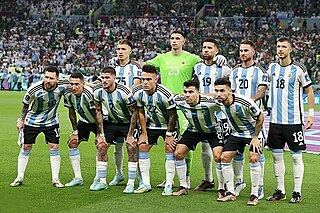
The FIFA World Cup, often simply called the World Cup, is an international association football competition contested by the senior men's national teams of the members of the Fédération Internationale de Football Association (FIFA), the sport's global governing body. The tournament has been held every four years since the inaugural tournament in 1930, except in 1942 and 1946 when it was not held because of the Second World War. The reigning champions are Argentina, who won their third title at the 2022 tournament.

The 2002 FIFA World Cup, also branded as Korea Japan 2002, was the 17th FIFA World Cup, the quadrennial football world championship for men's national teams organized by FIFA. It was held from 31 May to 30 June 2002 at sites in South Korea and Japan, with its final match hosted by Japan at International Stadium in Yokohama.
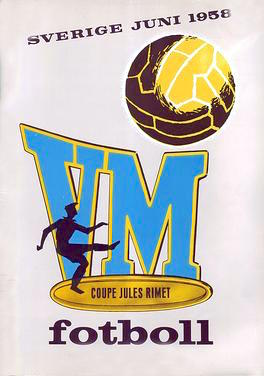
The 1958 FIFA World Cup was the sixth FIFA World Cup, a quadrennial football tournament for men's senior national teams, and was played in Sweden from 8 to 29 June 1958. It was the first FIFA World Cup to be played in a Nordic country.

The 1994 FIFA World Cup was the 15th FIFA World Cup, the world championship for men's national soccer teams. It was hosted by the United States and took place from June 17 to July 17, 1994, at nine venues across the country. The United States was chosen as the host by FIFA on July 4, 1988. Despite soccer's relative lack of popularity in the host nation, the tournament was the most financially successful in World Cup history. It broke tournament records with overall attendance of 3,587,538 and an average of 68,991 per game, marks that stood unsurpassed as of 2022 despite the expansion of the competition from 24 to 32 teams starting with the 1998 World Cup.

Franz Anton Beckenbauer is a German former professional footballer and manager. In his playing career he was nicknamed Der Kaiser because of his elegant style, dominance and leadership on the field, and also as his first name "Franz" is reminiscent of the Austrian emperors. He is widely regarded to be one of the greatest players in the history of the sport. A versatile player who started out as a midfielder, Beckenbauer made his name as a central defender. He is often credited as having invented the role of the modern sweeper (libero). With success at club and international level, he is one of nine players to have won the FIFA World Cup, the UEFA Champions League and the Ballon d'Or.

The 1970 FIFA World Cup was the ninth edition of the FIFA World Cup, the quadrennial international football championship for men's senior national teams. Held from 31 May to 21 June in Mexico, it was the first World Cup tournament held outside Europe and South America, and it was also the first held in North America. Teams representing 75 nations from all six populated continents entered the competition, and its qualification rounds began in May 1968. Fourteen teams qualified from this process to join host nation Mexico and defending champions England in the 16-team final tournament. El Salvador, Israel and Morocco made their debut appearances at the final stage.

The 1974 FIFA World Cup was the tenth FIFA World Cup, a quadrennial football tournament for men's senior national teams, and was played in West Germany between 13 June and 7 July. The tournament marked the first time that the current trophy, the FIFA World Cup Trophy, created by the Italian sculptor Silvio Gazzaniga, was awarded. The previous trophy, the Jules Rimet Trophy, had been won for the third time by Brazil in 1970 and awarded permanently to the Brazilians. This was the first out of three World Cups to feature two rounds of group stages.

The 1982 FIFA World Cup was the 12th FIFA World Cup, a quadrennial football tournament for men's senior national teams, and was played in Spain between 13 June and 11 July 1982. The tournament was won by Italy, who defeated West Germany 3–1 in the final, held in the Santiago Bernabéu Stadium in the capital, Madrid. It was Italy's third World Cup title, but their first since 1938. The defending champions, Argentina, were eliminated in the second round. Algeria, Cameroon, Honduras, Kuwait and New Zealand made their first appearances in the finals.
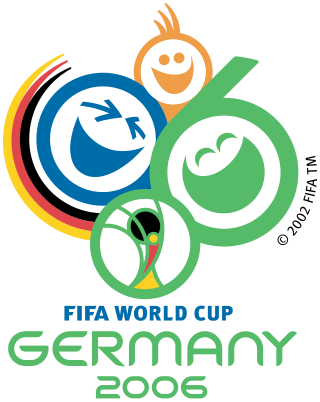
The 2006 FIFA World Cup, also branded as Germany 2006, was the 18th FIFA World Cup, the quadrennial international football world championship tournament. It was held from 9 June to 9 July 2006 in Germany, which had won the right to host the event in July 2000. Teams representing 198 national football associations from all six populated continents participated in the qualification process which began in September 2003. Thirty-one teams qualified from this process along with hosts Germany for the finals tournament. It was the second time that Germany staged the competition and the first as a unified country along with the former East Germany with Leipzig as a host city, and the 10th time that the tournament was held in Europe.

The 2010 FIFA World Cup, also branded as South Africa 2010, was the 19th FIFA World Cup, the world championship for men's national football teams. It took place in South Africa from 11 June to 11 July 2010. The bidding process for hosting the tournament finals was open only to African nations. In 2004, the international football federation, FIFA, selected South Africa over Egypt and Morocco to become the first African nation to host the finals.
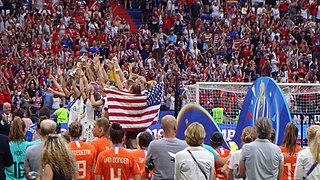
The FIFA Women's World Cup is an international association football competition contested by the senior women's national teams of the members of Fédération Internationale de Football Association (FIFA), the sport's international governing body. The competition has been held every four years and one year after the men's FIFA World Cup since 1991, when the inaugural tournament, then called the FIFA Women's World Championship, was held in China. Under the tournament's current format, national teams vie for 31 slots in a three-year qualification phase. The host nation's team is automatically entered as the 32nd slot. The tournament, called the World Cup Finals, is contested at venues within the host nation(s) over a period of about one month.

The France national football team represents France in men's international football matches. It is governed by the French Football Federation, the governing body for football in France. It is a member of UEFA in Europe and FIFA in global competitions. The team's colors and imagery reference two national symbols: the French red-white-blue tricolour and Gallic rooster. The team is colloquially known as Les Bleus. They play home matches at the Stade de France in Saint-Denis and train at INF Clairefontaine in Clairefontaine-en-Yvelines.
The FIFA Confederations Cup was an international association football tournament for men's national teams, held every four years by FIFA. It was contested by the holders of each of the six continental championships, along with the current FIFA World Cup holder and the host nation, to bring the number of teams up to eight.

The 2014 FIFA World Cup was the 20th FIFA World Cup, the quadrennial world championship for men's national football teams organised by FIFA. It took place in Brazil from 12 June to 13 July 2014, after the country was awarded the hosting rights in 2007. It was the second time that Brazil staged the competition, the first being in 1950, and the fifth time that it was held in South America.

The FIFA Men's World Ranking is a ranking system for men's national teams in association football, led by Brazil as of 2022. The teams of the men's member nations of FIFA, football's world governing body, are ranked based on their game results with the most successful teams being ranked highest. The rankings were introduced in December 1992, and eight teams have held the top position, of which Brazil have spent the longest ranked first.
The FIFA U-17 World Cup, founded as the FIFA U-16 World Championship, later changed to U-17 in 1991 and to its current name in 2007, is the world championship of association football for male players under the age of 17 organized by Fédération Internationale de Football Association (FIFA). The current champion is Brazil, which won its fourth title at the 2019 tournament on home soil.
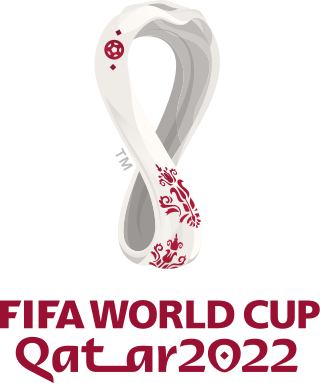
The 2022 FIFA World Cup was an international football tournament contested by the men's national teams of FIFA's member associations and 22nd edition of the FIFA World Cup. It took place in Qatar from 20 November to 18 December 2022, making it the first World Cup held in the Arab world and Muslim world, and the second held entirely in Asia after the 2002 tournament in South Korea and Japan.

The 2017 FIFA Confederations Cup was the 10th and final edition of the FIFA Confederations Cup, a quadrennial international men's football tournament organised by FIFA. It was held in Russia, from 17 June to 2 July 2017, as a prelude to the 2018 FIFA World Cup.

The 2022 FIFA World Cup qualification was the qualifying process which decided the 31 teams that would join hosts Qatar, who received an automatic spot, at the 2022 FIFA World Cup.
The 2026 FIFA World Cup will be the 23rd FIFA World Cup, the quadrennial international men's soccer championship contested by the national teams of the member associations of FIFA. The tournament will be jointly hosted by 16 cities in three North American countries: Canada, Mexico, and the United States. The United States will host 60 matches, including every match from the quarterfinals onward, while neighboring Canada and Mexico will each host 10 matches, making a total of 80 matches. The tournament will be the first hosted by three nations. Argentina are the defending champions.
















